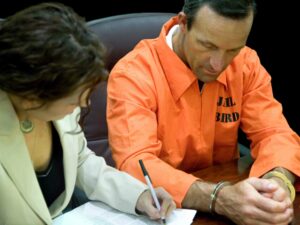Forensic psychiatry is a specialized branch of psychiatry that involves the intersection between law and mental health. Forensic psychiatrists work with legal professionals, such as judges, lawyers, and law enforcement officials, to evaluate and treat individuals who have mental health disorders and are involved in the criminal justice system. They play an important role in helping the legal system make informed decisions about a defendant’s mental state and their ability to stand trial or be held responsible for their actions.
Contents
Role of Forensic Psychiatrists

Forensic psychiatrists play a crucial role in the legal system by providing expertise in the assessment, diagnosis, and treatment of individuals who have mental health disorders and are involved in the criminal justice system. Here are some of the key roles that forensic psychiatrists fulfill:
- Evaluating Competency to Stand Trial: One of the primary roles of forensic psychiatrists is to evaluate whether a defendant has the mental capacity to understand the charges against them and participate in their defense. They assess the defendant’s ability to comprehend the legal proceedings, communicate with their attorney, and make rational decisions.
- Assessing Mental State at the Time of the Crime: Forensic psychiatrists also evaluate a defendant’s mental state at the time they committed the crime. This assessment can be critical in determining whether the defendant was legally insane at the time of the offense and therefore not responsible for their actions.
- Providing Treatment for Mentally Ill Offenders: Forensic psychiatrists may work with mentally ill offenders who are in correctional facilities, providing treatment and therapy to help manage their conditions and reduce the risk of future offenses.
- Evaluating Mental Health in Civil Cases: Forensic psychiatrists are in civil cases, such as personal injury or workers’ compensation cases, to evaluate the mental health of individuals involved in the case.
- Providing Expert Testimony: Forensic psychiatrists help to testify in court as expert witnesses, providing their professional opinions and insights to assist the court in making informed decisions about the mental state of a defendant or plaintiff.
How Do Forensic Psychologists Evaluate Defendants?
Competency to stand trial is a legal concept that refers to a defendant’s ability to understand the charges against them and to assist in their defense. Furthermore, Forensic psychiatrists play a critical role in assessing a defendant’s competency to stand trial. Here are some of the ways forensic psychiatrists evaluate defendants:
- Clinical Interview: Forensic psychiatrists typically begin the evaluation process with a clinical interview. They will ask the defendant questions about their understanding of the charges against them, the legal process, and their ability to assist in their defense.
- Mental Status Examination: Forensic psychiatrists will also conduct a mental status examination to evaluate the defendant’s mental state. They will assess the defendant’s level of cognitive functioning, their ability to understand and remember information, and their ability to communicate effectively.
- Psychological Testing: Forensic psychiatrists may also use psychological testing to assess the defendant’s cognitive abilities and mental health status. Tests such as the Minnesota Multiphasic Personality Inventory (MMPI) and the Wechsler Adult Intelligence Scale (WAIS) can provide valuable information about the defendant’s mental state.
- Review of Medical Records: Forensic psychiatrists may also review the defendant’s medical records, including any prior diagnoses of mental illness or treatment for mental health conditions.
- Collaboration with Legal Professionals: Forensic psychiatrists work closely with legal professionals, such as judges, attorneys, and court personnel, to understand the legal requirements for competency to stand trial and to provide recommendations based on their evaluation.
The Role of Forensic Psychiatrists in Correctional Facilities

Treating mentally ill offenders is an essential aspect of forensic psychiatry. Many individuals with mental health disorders end up in correctional facilities, and forensic psychiatrists play a vital role in providing treatment and therapy to help manage their conditions and reduce the risk of future offenses. Here are some of the ways forensic psychiatrists contribute to the treatment of mentally ill offenders in correctional facilities:
- Medication Management: Forensic psychiatrists work with correctional staff to ensure that mentally ill offenders receive appropriate medication for their conditions. They monitor medication efficacy and adjust dosages as necessary.
- Psychotherapy: Forensic psychiatrists provide psychotherapy to mentally ill offenders to help them manage their symptoms, cope with stressors, and develop coping mechanisms. They may use cognitive-behavioral therapy, group therapy, and other evidence-based therapies.
- Crisis Intervention: Forensic psychiatrists may be called upon to provide crisis intervention services to mentally ill offenders who are experiencing a mental health crisis, such as suicidal ideation or hallucinations.
- Collaboration with Correctional Staff: Forensic psychiatrists work closely with correctional staff to develop treatment plans that are consistent with the goals of the correctional facility. They provide education and training to correctional staff to help them understand the unique needs of mentally ill offenders.
- Coordination with Community Providers: Forensic psychiatrists also work to coordinate care with community providers to ensure that mentally ill offenders receive appropriate care after their release from correctional facilities.
Controversies and Criticisms
- Subjectivity: Forensic psychiatry is an inherently subjective field, and the evaluation and diagnosis of mental health conditions are often subject to individual interpretations. This subjectivity can be a source of controversy and criticism.
- Bias: Forensic psychiatrists may be subject to bias, either consciously or unconsciously. Bias can influence the evaluation process and may result in incorrect or incomplete assessments.
- Inadequate Training: Some critics of forensic psychiatry argue that the training and education provided to forensic psychiatrists may not adequately prepare them for the complex intersection between law and mental health.
- Stigma: There is still a significant stigma surrounding mental illness, and this can impact the way that mentally ill offenders have treated by the legal system. Forensic psychiatrists may face challenges in convincing legal professionals and the public of the importance of treating mentally ill offenders.
- Ethical Concerns: Forensic psychiatrists must navigate complex ethical issues, including concerns around confidentiality and the use of their evaluations in legal proceedings.
The Future of Forensic Psychiatry

The field of forensic psychiatry is constantly evolving, and advancements in research and technology are opening up new avenues for understanding and treating mental health conditions in the legal system. Here are some of the areas where we can expect to see advancements in the future of forensic psychiatry:
- Neuroimaging: Furthermore, advances in neuroimaging technology, such as functional magnetic resonance imaging (fMRI) and positron emission tomography (PET), may provide new insights into the neural mechanisms underlying mental health conditions. This information may be useful in the assessment and treatment of mentally ill offenders.
- Pharmacogenomics: Furthermore, the field of pharmacogenomics examines how genetic differences can impact an individual’s response to medication. In forensic psychiatry, this research could be used to develop more personalized treatment plans for mentally ill offenders.
- Telepsychiatry: Furthermore, telepsychiatry, or the use of technology to provide psychiatric care remotely, may provide a way to overcome some of the challenges of providing mental health care in correctional facilities. This technology could allow forensic psychiatrists to provide more accessible and cost-effective care to mentally ill offenders.
- Big Data: Furthermore, the use of big data, or large datasets that can be analyzed using advanced analytics, may provide new insights into the prevalence and treatment of mental health conditions in the legal system. This information could be used to develop more effective treatment plans and interventions.
- Integration of Behavioral Health and Primary Care: There is a growing recognition of the importance of integrating behavioral health and primary care. In forensic psychiatry, this integration could help ensure that mentally ill offenders receive comprehensive and holistic care that addresses all aspects of their health.
Conclusion
Forensic psychiatry is a specialized branch of psychiatry that plays a critical role in the legal system. Furthermore, forensic psychiatrists provide expertise in the assessment, diagnosis, and treatment of individuals who have mental health disorders and have an involvement in the criminal justice system. They evaluate a defendant’s competency to stand trial and their mental state at the time of the offense, provide treatment and therapy to mentally ill offenders in correctional facilities, and contribute to the overall understanding of mental health conditions in the legal system.
While forensic psychiatry faces challenges and criticisms, advancements in research and technology provide exciting opportunities for the future of the field. Neuroimaging, pharmacogenomics, telepsychiatry, big data, and the integration of behavioral health and primary care all hold the potential to improve the lives of mentally ill offenders and enhance the legal system’s ability to provide fair and just outcomes.
For more information, please contact MantraCare. A psychiatrist is a medical doctor who specializes in the diagnosis, treatment, and prevention of mental illnesses and emotional disorders. If you have any queries regarding Online Counseling experienced therapists at MantraCare can help: Book a trial therapy session


